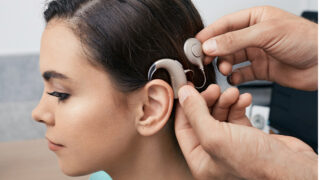Do you or your partner snore? It may seem normal, but it can actually be an indicator of a serious health issue. Here’s what you need to know about snoring and Obstructive Sleep Apnea, and when to seek help.
What causes snoring?
While asleep, the throat relaxes, creating an interruption to the air flow through passages at the back of the nose and mouth. This obstruction creates turbulent airflow, leading to a vibration in the soft tissue, which produces the familiar snoring sound. HENCEL TORRES is a Clinical Sleep Educator at Snore Solutions International, a practice in Tanglin Shopping Centre that’s dedicated to the treatment of snoring using effective and safe therapies. She says, “Simple snoring can sometimes be remedied by changing your body position and cutting down alcohol near bed time as alcohol relaxes your muscles. Loud, habitual snoring, on the other hand, can pose a serious health threat.”
Snoring or sleep apnea?
Snoring is a major sign of Obstructive Sleep Apnea (OSA), a serious, chronic condition in which breathing repeatedly stops and starts. “Apnea” literally means “without breath”.
“When people with OSA sleep, the airway collapses, causing reduced or complete cessation of airflow despite ongoing breathing efforts,” says Hencel. “These disruptions cause oxygen levels to drop and are associated with a brief awakening from sleep. This recurring breathing cycle causes fragmented sleep, daytime sleepiness, poor concentration and an increased risk of accidents.”
Untreated sleep apnea has also been linked to increased risks of type 2 diabetes, heart disease, cancer, anxiety and depression.
Who’s at risk?
One of the major risk factors is excess body weight, although OSA can certainly affect anyone. And, while it is more common in men than women, females who are obese, pregnant and post-menopausal have a greater risk of the sleep disorder.
Sleep apnea can occur at any age – even during childhood – yet it’s most common between young adulthood and middle age, says Hencel. Other common risk factors include hypertension (high blood pressure), a family history of the condition, and a large neck size, which means there’s more soft tissue that can block the airway during sleep.
When to seek help for snoring
According to Hencel, a snorer should seek help if he or she experiences:
* Excessive daytime sleepiness, or waking up not feeling rested
* Morning headaches
* High blood pressure
* Frequent trips to the bathroom during the night
* Dry throat or dry mouth
* Memory loss or a decreased ability to concentrate
* Decreased sexual drive
* Irritability
* Observed pauses in breathing at night by a bed partner
* Waking up gasping for breath
“An evaluation to check whether or not you have sleep apnea often involves overnight monitoring at a sleep centre where your breathing and other body functions are assessed during sleep,” says Hencel. “These tests usually measure your heart rate, blood oxygen level, airflow and breathing patterns. The severity of your sleep apnea will in turn determine your treatment.” Home sleep testing, where you’re assessed in the comfort of your own home, is also an option.
Treatment options
Fortunately, snoring and obstructive sleep apnea can be treated. For milder cases of sleep apnea, Hencel says doctors usually recommend lifestyle changes, such as losing weight or quitting smoking, or sleeping on one’s side (Positional Therapy). If a patient’s sleep apnea is moderate to severe, Continuous Positive Airway Pressure (CPAP) is usually recommended.
“CPAP delivers air pressure through a mask while you sleep. The air acts like a splint to keep your upper airway passages open, preventing apnea and snoring,” says Hencel. “CPAP can prevent or reverse serious consequences of obstructive sleep apnea.” Benefits of the therapy include reduced risks of heart disease, stroke and cancer, increased insulin sensitivity, and better sleep patterns, concentration, daytime alertness and emotional stability.
“Another option is wearing an oral appliance device that is designed to move your lower jaw forward, creating more airway space,” she says. “Surgery is usually only an option after other treatments have failed.”
Snore Solutions International
#06-01 Tanglin Shopping Centre, 19 Tanglin Road
9775 2985
info@snoreinternational.com | snoreinternational.com
Like this? See our Health & Fitness section:
Is screen time damaging your eyes?
Allergy testing in Singapore






